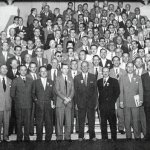ILAR
The importance of a global collaboration of the rheumatic disease societies was addressed in 2008, when the International League Against Rheumatism reincorporated as the International League of Associations for Rheumatology (ILAR). The reincorporation led to a more focused mission to advance rheumatology in developing countries. ILAR’s executive committee consists of the presidents and presidents-elect of the ACR, AFLAR, APLAR, EULAR, and PANLAR. The group generally meets at the ACR annual meeting and at EULAR’s annual congress. The collaboration of the leaders of the ACR and the rheumatology leagues has resulted in a renewed commitment to support programs that lead to progress in the practice and education of rheumatology in countries where there is an exceptional need, focusing specifically on developing countries. Since the reincorporation, ILAR has provided over $300,000 in funding to projects developed to advance the education and clinical practice of rheumatology in areas of the world where there is a need, including India, Zambia, Macedonia, Morocco, and the Philippines. Currently, ILAR is accepting project proposals for the 2012 fiscal year; the proposal form can be found on ILAR’s website, www.ilar.org.
The independent and collaborative efforts of the ACR and each league—AFLAR, APLAR, EULAR, and PANLAR—are all important in the pursuit to advance rheumatology. Interacting with the members of the other leagues gives the ACR the opportunity to share rheumatic disease knowledge and administrative expertise with rheumatologists from around the world. Having an ongoing dialogue within the ACR and among all the rheumatology leagues provide opportunities to improve research, education, and quality for rheumatology health professionals and their patients. These international efforts are making the world smaller after all.
